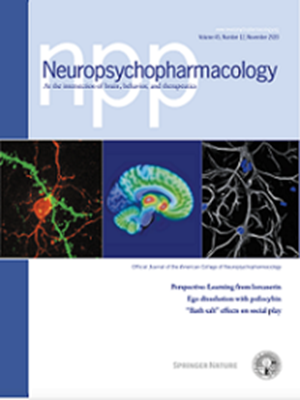3-甲基甲卡西酮(3-MMC)剂量增加后的安全性和认知药效学:首次人体设计药物研究。
IF 6.6
1区 医学
Q1 NEUROSCIENCES
引用次数: 0
摘要
3-甲基卡西酮(3-MMC)是一种设计药物,属于合成卡西酮类。由于与过量使用有关的公共卫生问题,该化合物已被列入许多司法管辖区的名单。到目前为止,还没有临床研究评估3-MMC在低至中剂量娱乐性范围内的风险概况。目前的首次人体研究(N = 14)在交叉安慰剂对照试验中评估了三种递增剂量的3-MMC(25、50和100 mg)对生命体征、神经认知功能、意识状态、食欲和药物欲望的影响。在给药后5小时内反复进行一系列神经认知测试和问卷调查以及生命体征测量。总体而言,3-MMC引起了心率和血压的剂量依赖性增加,尽管没有临床意义,以及主观兴奋感。此外,3-MMC在多个神经认知领域诱导了与剂量相关的任务表现增强,包括处理速度、认知灵活性、精神运动功能、注意力和记忆。3-MMC对冲动控制没有影响。参与者还报告了解离和迷幻效果的轻微增加,食欲下降,并且对3-MMC的好感和渴望程度随着时间的推移而增加。总的来说,3-MMC的心血管、精神兴奋和拟精神特征似乎与安非他明结构相关的化合物一致。结论是,低至中等剂量的3-MMC耐受性良好且安全,潜在的健康风险可能只发生在高剂量或过量剂量的3-MMC。本文章由计算机程序翻译,如有差异,请以英文原文为准。

Safety and cognitive pharmacodynamics following dose escalations with 3-methylmethcathinone (3-MMC): a first in human, designer drug study
3-Methylmethcathinone (3-MMC) is a designer drug that belongs to the group of synthetic cathinones. The compound has been scheduled in many jurisdictions because of public health concerns associated with excessive use. To date, there are no clinical studies that have evaluated the risk profile of 3-MMC in the recreational range of low to moderate doses. The current, first-in-human study (N = 14) assessed the impact of three escalating doses of 3-MMC (25, 50 and 100 mg) on vital signs, neurocognitive function, state of consciousness, appetite and drug desire, in a cross-over, placebo-controlled trial. A battery of neurocognitive tests and questionnaires as well as measures of vital signs were repeatedly administered up to 5 h after dosing. Overall, 3-MMC caused dose-dependent increases in heart rate and blood pressure, though not of clinical significance, and feelings of subjective high. Additionally, 3-MMC induced dose-related enhancement of task performance across several neurocognitive domains, including processing speed, cognitive flexibility, psychomotor function, attention and memory. Impulse control was not affected by 3-MMC. Participants also reported mild increases in dissociative and psychedelic effects, decreased appetite, and gave greater ratings of liking and wanting for 3-MMC that were transient over time. Overall, the cardiovascular, psychostimulant and psychotomimetic profile of 3-MMC appears consistent with that of compounds structurally related to amphetamine. It is concluded that low to moderate doses of 3-MMC were well tolerated and safe and that potential health risks might only occur at high or excessive doses of 3-MMC.
求助全文
通过发布文献求助,成功后即可免费获取论文全文。
去求助
来源期刊

Neuropsychopharmacology
医学-精神病学
CiteScore
15.00
自引率
2.60%
发文量
240
审稿时长
2 months
期刊介绍:
Neuropsychopharmacology is a reputable international scientific journal that serves as the official publication of the American College of Neuropsychopharmacology (ACNP). The journal's primary focus is on research that enhances our knowledge of the brain and behavior, with a particular emphasis on the molecular, cellular, physiological, and psychological aspects of substances that affect the central nervous system (CNS). It also aims to identify new molecular targets for the development of future drugs.
The journal prioritizes original research reports, but it also welcomes mini-reviews and perspectives, which are often solicited by the editorial office. These types of articles provide valuable insights and syntheses of current research trends and future directions in the field of neuroscience and pharmacology.
 求助内容:
求助内容: 应助结果提醒方式:
应助结果提醒方式:


